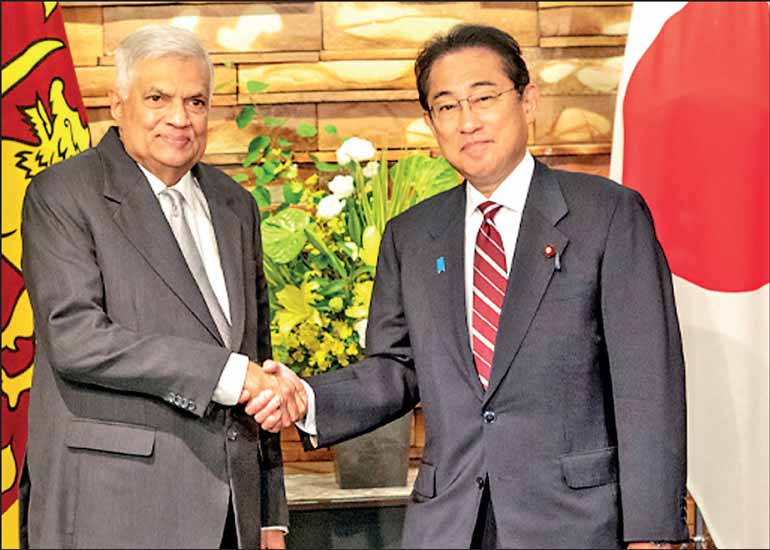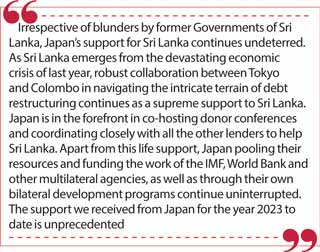Sunday Feb 22, 2026
Sunday Feb 22, 2026
Thursday, 26 October 2023 00:18 - - {{hitsCtrl.values.hits}}

President Ranil Wickremesinghe with Japanese Prime Minister Fumio Kishida
 Many Sri Lankan stakeholders lost the opportunity to attract Japanese investment or trade to Sri Lanka in 2020 when former Japanese Prime Minister, the late Abe’s Government announced a package of incentives to Japanese companies to shift production out of China consequent to large scale supply chain breakdowns.
Many Sri Lankan stakeholders lost the opportunity to attract Japanese investment or trade to Sri Lanka in 2020 when former Japanese Prime Minister, the late Abe’s Government announced a package of incentives to Japanese companies to shift production out of China consequent to large scale supply chain breakdowns.
Whilst the Government of Sri Lanka, the BOI, EDB, Trade Chambers and many stakeholders were deeply engrossed and trying to grapple with COVID fears, other Asian countries including Vietnam and India worked in many fronts grouping their synergies in public-private joint strategies. Whilst some Chamber heads made prophecies such as “the time is not right” few Sri Lankan companies who had the courage to fight the wave ended up getting windfalls working with few Japanese partners. Playing field was much different then as the Abe Government was in the forefront of supporting Japanese manufacturers to move out of China. India and Vietnam however won the race at that time.
A window of opportunity once again
Prime Minister Fumio Kishida speaking at the Prime Minister’s Office on Tuesday 17 October stated that his Government has decided to put together a package of measures to strengthen cooperation with the Global South emerging and developing countries.
If we could all work together this will be another opportunity to lay the foundation again as Sri Lanka falls within the qualifying criteria.
Recent trends – Japan-China trade
No doubt there will be continuing issues with Japan and China revolving around Senkaku Islands, Chinese military demonstrations or training around Taiwan, discharge of treated radioactive water from the Fukushima nuclear plant into the Pacific Ocean and many other issues. These will continue to spring up. But it is an indisputable fact that China and Japan trade will continue to take place in such a significant manner (2021 exports from Japan $ 164 billion and imports to Japan $ 186 billion).
Can President Wickremesinghe make a dent?
President Wickremesinghe’s May 2023 visit to Japan looks like a sign that every cloud has a silver lining.
President Wickremesinghe during his official visit to Japan has called for bilateral collaboration highlighting emerging opportunities in Sri Lanka that Japanese businesses could leverage as our country restores stability.
In the roundtable discussion in Tokyo on 26 May, the President had spoken of Sri Lanka’s commitment in stabilising and liberalising the economy while actively inviting new foreign ventures. At a separate event, he had also called for increased cooperation between Sri Lanka and Japan in the two countries’ respective digital transformation efforts.
The President, since his appointment in July 2022, has indicated an eagerness to repair damaged relations with Tokyo after his predecessor’s administration unilaterally cancelled a $ 1.5 billion Japan-funded light rail transit (project) and a tripartite deal between Japan, Sri Lanka and India to develop the Colombo Port’s East Container Terminal (ECT).
The Japanese business community applauded and expressed positive sentiments about the meeting President Wickremesinghe had with Japanese Prime Minister Fumio Kishida in Tokyo on Thursday 25 May, when President Wickremesinghe extended an apology for the cancellation of the LRT project and discussed legislation to make sure that large-scale bilateral projects cannot be cancelled without mutual agreement.
Japan’s support continues
 Irrespective of blunders by former Governments of Sri Lanka, Japan’s support for Sri Lanka continues undeterred. As Sri Lanka emerges from the devastating economic crisis of last year, robust collaboration between Tokyo and Colombo in navigating the intricate terrain of debt restructuring continues as a supreme support to Sri Lanka. Japan is in the forefront in co-hosting donor conferences and coordinating closely with all the other lenders to help Sri Lanka. Apart from this life support, Japan pooling their resources and funding the work of the IMF, World Bank and other multilateral agencies, as well as through their own bilateral development programs continue uninterrupted. The support we received from Japan for the year 2023 to date is unprecedented.
Irrespective of blunders by former Governments of Sri Lanka, Japan’s support for Sri Lanka continues undeterred. As Sri Lanka emerges from the devastating economic crisis of last year, robust collaboration between Tokyo and Colombo in navigating the intricate terrain of debt restructuring continues as a supreme support to Sri Lanka. Japan is in the forefront in co-hosting donor conferences and coordinating closely with all the other lenders to help Sri Lanka. Apart from this life support, Japan pooling their resources and funding the work of the IMF, World Bank and other multilateral agencies, as well as through their own bilateral development programs continue uninterrupted. The support we received from Japan for the year 2023 to date is unprecedented.
Initiative taken by Japan
However the conditions have changed over the years. Recognising the importance of a robust relationship with Sri Lanka, Japan is “walking the talk” to support a historic friend in Sri Lanka. Japan has been a long-standing donor to the Government of Sri Lanka and World Food Programme for over a decade, providing critical assistance in emergencies, while supporting longer-term recovery and development efforts to strengthen food and nutrition security in the country. Japan’s help to Sri Lanka within the year 2023 itself had been phenomenal. Support for evidence-based drug use prevention, treatment and care initiative, providing JPY 503 million ($ 3.7 million), grant assistance for “The Project for the Improvement of Infectious Waste Management”, Government of Japan partnering with UNDP provides approx. Rs. 1,175 million (approx. $ 3.8 million) to support improvement of women’s economic wellbeing for smallholder farmer families, joining hands with UNFPA by funding $ 4.6 million to support women and girls’ health, providing $ 1.6 million to Sri Lanka through UN Women in support of humanitarian assistance for marginalised women and girls, contributing over $ 1.8 million to provide essential services for children, supporting Ampara, Batticaloa and Monaragala Districts under the scheme of “Grant Assistance for Grassroots Human Security Projects”, extending additional $ 6.6 million support to Sri Lanka for emergency food and nutrition assistance, providing humanitarian assistance of $ 46 million in diesel fuel for public hospitals as part of $ 104 million grant assistance in 2022, providing Night Navigation System for the Port of Trincomalee , providing new cold chain equipment and nutrition supplies totalling $ 3.5 million, are to name a few acts of benevolence. Imagine it all came in within the last 10 months!
Unworthy history of Japan-Sri Lanka Free Trade Agreement
Prospects for a Free Trade Agreement (FTA) between Sri Lanka and Japan had come under discussion at bilateral level as far back as June 2011. An important message was conveyed by Kazuyoshi Akaba, the visiting Japanese Senior Vice Minister of Economy in July 2014 to the then Minister of Industry and Commerce stating that “conclusion of FTAs alone is not sufficient for better trade. What is important is to develop a very robust foundation among the two countries”. This explains the reason why Sri Lanka was not ready to work towards an FTA at that time.
Re-emergence of hopes of an FTA
In this changing environment it is important to take note of the comments made at the Alumni Association of the Postgraduate Institute of Management (PIMA) by Katsuki Kotaro, Deputy Head of Mission of the Japanese Embassy. A diplomat par excellence gave the first indication that Japan is keen to ink a Free Trade Agreement (FTA) with Sri Lanka to increase bilateral trade between the two countries. This comment by the veteran diplomat has to be music to the ears of our key export sectors going through a hard hit currently. Several apparel factories have lost over 30% to 40% of their annual order volumes from our traditional markets in the USA and EU.
On the other hand Japan’s clothing imports in 2022 crossed a staggering $ 23 billion in January to November 2022 period, noting a 27% year-on-year surge. Japan imports clothing from USA, EU, Germany, Italy and France apart from South Asian countries. Therefore, a systematic negotiation of an FTA can bring new hopes to the SL apparel sector and the time is right now.
Kotaro further hinted, “Sri Lanka can improve on exports if more value addition is done for ‘raw material exports’ and towards this, Japanese investors are keen at formulating JVs with their local counterparts.” For our least exploited in terms of value additions, the Mineral sector too this could be a godsend if an FTA comes into place. Our IT service sector combined with a youthful resource of Japanese speaking skill sets can benefit immensely in such an initiative. The true value of our geographical location could be then harnessed bringing value to our ports maximising its role leading to a logistic hub to the region and also bringing rewards to our shipping and logistics sectors.
What Sri Lanka can offer to Japan
Apart from offering products and services for exports, value added exports and invitations to JV participation Sri Lanka also needs to examine how Sri Lanka can make such an FTA beneficial to Japan in the long run.Japan is dealing with senior citizens’ needs in a remarkable fashion. The challenges ahead of Japan can be understood by the share of the population that are 65 years or older was 29.1% in 2021, the largest proportion of any country, and it is expected to rise to one-third by 2036. There are an estimated 90,526 centenarians in Japan and 15% of the population is over 75.
Sri Lanka on the other hand has an unskilled workforce finding its way for jobs in West Asia where skills requirements are compromised thereby not earning what is rightful worth for Sri Lankans. Japan on the contrary seeks people who are trained as SSW (Specified skilled workers). Those over 18 years old, in good health, have the necessary occupational skills and Japanese language ability to work immediately without receiving any particular training. Skills and Japanese proficiency will be confirmed by a unified test conducted by Japan. Therefore a great opportunity lies for Sri Lankan youth with this SSW scheme in 12 occupations who are ready to take on jobs without prior training in Japan. However, a systematic language training leading to Japanese language skills matching Japanese Language Proficiency Tests is a vital need.
A Sri Lanka-Japan Free Trade Zone
It was a pleasure to read the recent announcement by the ambitious State Minister of Investment Promotion suggesting setting up of a SL-Japan Free Trade Zone in the areas of Bingiriya and Iranavila.
This indeed is a long felt need and many a discussion had taken place on this aspect. Then again setting up an exclusive FTZ for Japanese will it help? Have we done enough research to find whether Japanese industrialists will come to invest in a Sri Lanka FTZ? Are we in a position to give Japanese investors the market access to our neighbouring countries? Have we brought enough legislation to eliminate corruption? Can we guarantee Japanese investors a consistent policy framework? All these amount to giving the Japanese investors business confidence.
Have we done a comparative research study to see how our neighbours in India succeeded with the Neemrana Investment Zone in Rajasthan? Neemrana is a town in Alwar district of Rajasthan, India and is rapidly developing into a hub for Japanese industries and is the fastest growing industrial centre in North India. So far, more than 50 Japanese companies, including Daikin, Nissin Brake, Mytex Polymer and Nippon Pipe, among others, have invested over $ 800,000,000 in this zone.
One of the key criteria for the success of Neemrana is the three-year MoU between JETRO (Japan External Trade Organisation) and The Rajasthan State Industrial Development & Investment Corporation to bring in Japanese investment to India. We sincerely hope that our minister will be able to forge such a partnership with JETRO or the Ministry of Economy Trade and Industry Japan to make this idea a reality.
It is encouraging that the State Minister of Investment Promotion is seeking the support of the Japanese-Sri Lankan Business Council in Japan. However, can such a formidable task be achieved without engaging directly with the Japanese Government?
Any dedicated Japanese FTZ in Sri Lanka needs to be sustainable and a stage full of actors similar to Nirmana FTZ in Rajasthan, India.
(The writer is the Vice President of Sri Lanka-Japan Business Council and Past President of JASTEA.
He can be reached
at [email protected].)